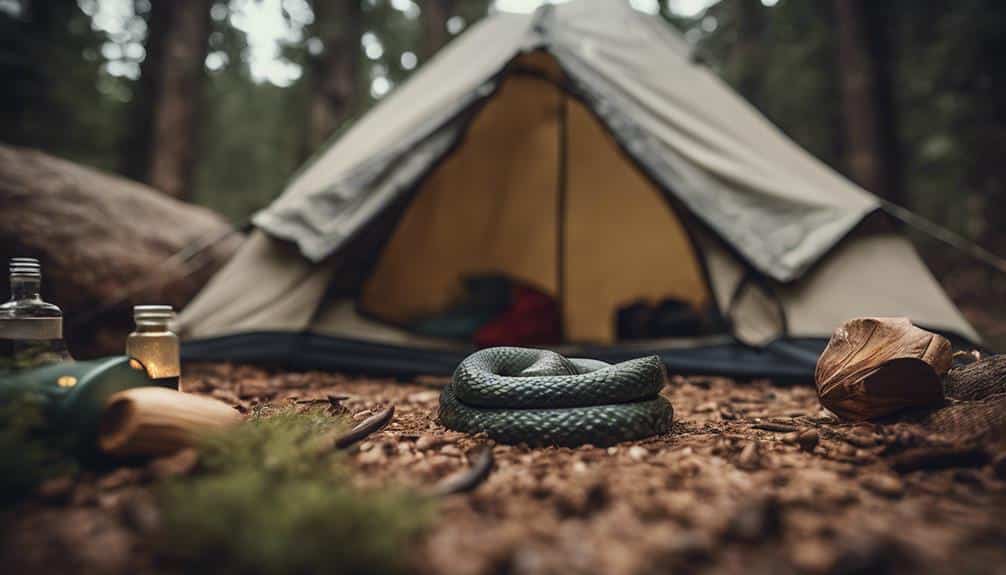Guarantee a safe camping trip by using natural snake repellents like cedarwood, cinnamon, and clove oils at your tent's perimeter. Ultrasonic devices emit high-frequency waves that disrupt snake behavior subtly. Chemical options such as naphthalene and sulfur emit odors deterring snakes effectively. Incorporating these repellents strategically around your camping area will help keep snakes at bay during your outdoor adventures.
Natural Snake Repellents
Try using natural snake repellents such as key oils and sulfur to discourage snakes from entering your camping tent. Snakes have a keen sense of smell, and certain scents can deter them from approaching your camping area.
Key oils like cedarwood, cinnamon, and clove can act as potent snake repellents due to their strong odor that snakes find unpleasant. By applying a few drops of these key oils around the perimeter of your tent or on entry points, you create a barrier that snakes are likely to avoid.
Additionally, sulfur is a natural element that emits a strong odor that snakes detest. Sprinkling sulfur powder around your camping site can help keep snakes at bay.
These natural repellents work by disrupting the sensory receptors of snakes, causing discomfort and deterring them from coming closer to your tent. Incorporating these key snake repellents into your camping routine can provide an added layer of protection against unwanted snake encounters.
Ultrasonic Snake Deterrents
Utilize ultrasonic snake deterrent devices as a modern and non-invasive method to help keep snakes away from your camping tent. These innovative devices emit high-frequency sound waves that are disruptive to snakes, causing discomfort and deterring them from approaching the protected area. The ultrasonic waves produced by these devices are typically inaudible to humans, making them a practical and safe option for snake repellent in camping scenarios.
The effectiveness of ultrasonic snake deterrents can vary depending on factors such as the type of snake species present in the area, the terrain, and environmental conditions. It's vital to place the devices strategically around your camping tent to create a barrier that discourages snakes from entering your space. For best results, ensure that the ultrasonic snake deterrents have a wide coverage range and are placed at appropriate heights to maximize their effectiveness in deterring snakes.
When using ultrasonic snake deterrents, it's important to follow the manufacturer's instructions for placement and maintenance to achieve the best possible outcomes. Keep in mind that while ultrasonic devices offer a promising solution for keeping snakes at bay, they should be used in conjunction with other preventive measures for thorough snake repellent protection around your camping tent.
Chemical Snake Repellent Options
Incorporate chemical snake repellents into your camping gear arsenal to bolster protection against snakes near your tent. Chemical snake repellents work by emitting odors or tastes that deter snakes from entering specific areas.
One common chemical repellent is made from naphthalene, which disrupts a snake's sense of smell, prompting them to avoid treated areas. Another effective chemical option is sulfur, which produces a strong scent that snakes find unpleasant, deterring them from coming close to your tent.
When selecting a chemical snake repellent, make sure it's safe for the environment and follows usage guidelines to prevent harm to wildlife. Follow the instructions carefully, applying the repellent generously around your camping site perimeter and tent entrance.
It's crucial to reapply the repellent as directed to maintain its effectiveness throughout your camping trip.
Frequently Asked Questions
Can Snake Repellents Harm Pets or Children?
Snake repellents can harm pets or children if ingested or exposed to excessive amounts. Keep repellents out of reach, follow usage instructions carefully, and explore natural alternatives to minimize risks to loved ones while protecting against snakes.
Do These Repellents Work on All Snake Species?
Yes, snake repellents vary in effectiveness based on the species. Some repellents work well against common snakes but might be less effective against rare or highly adaptable species. It's important to research specific products for targeted results.
How Often Should Repellents Be Reapplied?
To maintain snakes away effectively, it's essential to reapply repellents every 2-4 weeks. This guarantees a continuous barrier that deters snakes from entering your camping tent. Consistent application is vital for long-lasting protection.
Are These Repellents Waterproof for Outdoor Use?
Yes, these repellents are specifically designed to withstand outdoor conditions, including being waterproof. This feature guarantees their effectiveness in protecting your camping tent from snakes. Reapply as recommended to maintain their repellent properties.
Can Snake Repellents Attract Other Pests?
Snake repellents, while effective against snakes, may not attract other pests directly. However, some scents could inadvertently draw in insects. In order to prevent this, opt for repellents having ingredients tailored specifically for deterring snakes without luring other creatures.
Conclusion
To sum up, when it comes to keeping snakes away from your camping tent, it's crucial to select the right repellent method for your needs.
By utilizing a combination of natural remedies, ultrasonic deterrents, and chemical options, you can create a highly effective barrier against unwanted serpentine visitors.
Remember, the safety and peace of mind of you and your fellow campers are of the utmost importance, so don't hesitate to take the necessary precautions.

